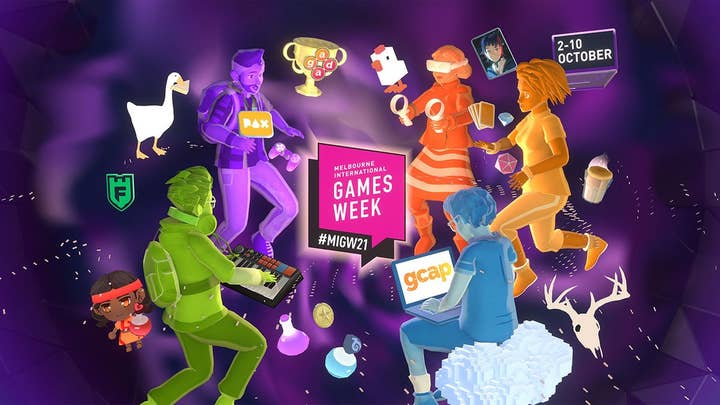The show must go on: Running Melbourne International Games Week during a sixth lockdown
Creative Victoria's Fran Kerlin on continuing seven years of work in the face of the pandemic
While much of the world is transitioning back to physical events, some regions are still focusing on digital iterations. One such event is Melbourne International Games Week. For the second year in a row, plans for in-person activities have been dropped in favour of an online-only celebration of games.
Fran Kerlin, senior manager for digital games and fashion at MIGW organiser Creative Victoria, says tells us the shift to a digital format means her team has been unable to replicate a few components that usually make up a physical Games Week, but then others have emerged that have only been enabled, or gotten more attention, due to the reach of the internet.
After the inevitably online-only MIGW of 2020, Creative Victoria had hoped to bring the event back to the real world in force this year -- until a couple of months ago, when Melbourne entered lockdown for the sixth time since the pandemic began. According to ABC News, the city now holds the world record for the longest time spent in lockdown.

But the show must go on -- in fact, it's going on right now -- if only to maintain the momentum Creative Victoria has built over the seven years since the inaugural Melbourne International Games Week. And, as Kerlin points out, the impact of COVID-19 has "demonstrated six ways from Sunday" the positive aspects of the games industry.
"Games in Australia have grown by 29% in the last year-on-year, and it's because games have basically been the link that has kept a lot of people sane," she says. "They've connected with family and friends. We've got lots of people who have never played a game in their life, they've been introduced to it or tempted to play, and thankfully, we're keeping those people. It's become a whole lot more mainstream than perhaps it was a few years ago."
Despite the lack of physical gatherings, Creative Victoria and other organisations have put together dozens of events for 2021, ranging from multi-day conferences to special livestreams and workshops. It's in keeping with the ethos behind the original Melbourne International Games Week, which brought together conferences and expos like Game Connect: Asia Pacific (GCAP) and PAX Australia into one week. In recent years, the 'week' has spilled over to fill ten days, with the aim of creating a moment where the entire Australian games industry attracts attention it might not get throughout the rest of the year.
"You get critical mass," Kerlin explains. "So, rather than having PAX in October and having GCAP, a lot of developers from interstate, New Zealand, south-east Asia might not be in a position to travel twice. You make every post a winner, and you attract a greater number, and the advantages to that are that people can do an industry gig with a GCAP, or a GCAP Invest, or whatever that might look like, and then you get to go through PAX. For us, it's about the opportunity to build that critical mass, to tip all those kinds of events into that ten-day window.
"That doesn't mean to say that we haven't got other events through the course of the year, and certainly, as this COVID thing is dragging on a bit, and you're in and out of lockdown, and borders are closed internationally, we are looking at other events of a similar style, not obviously on the grand scale that an MIGW is, but there may be capacity to build a smaller event that marries other programmes in the first half of the year."
Some of these events have been particularly crucial to continue, even during the pandemic. Kerlin offers GCAP Invest as an example, which brings developers, publishers and investors to forge new partnerships. Kerlin says this is more important than ever, since Australian developers have been unable to travel overseas for almost two years.
"It's a joyous thing when you pick up the Herald Sun or The Age and you don't read how games lead to slaughter of thousands"
"That's put quite a degree of stress on the industry," she says. "As you would know, it's very difficult to build that warmth across and pitch your product. I mean, a lot of devs are pretty nervous about pitching anyway, but when it's in such a formal space, it's not like when you've got your 20 minutes with Sony or Nintendo at GDC. You rock up, you sit down, you show your game, and you immediately build that rapport. So, that's been a real challenge."
The online MIGW has also enabled Creative Victoria to continue developing some relationships of its own, ones that connect the games industry with other sectors. For example, three years ago the team partnered with the Victoria Music Development Office on High Score, a two-day event that brought developers and composers together to discuss opportunities. The interest in events that combine music and games grew, to the point where there are now four music-centric events, including a performance of video game music by Orchestra Victoria.
"They came to us and we kicked around loads of ideas," says Kerlin. "What if we chose a game that everybody was familiar with that has, let's say it's got a contemporary feel in terms of music? What would that game look like if it was done to something more classical? What if it had a hip-hop soundtrack? So, we kind of went a little bit mad with it, and I'm really looking forward to this Orchestra Victoria event to show just how influential music is."

The ten-day festival also aims to strengthen the connection between video games companies and academia. For example, the Victorian city of Ballarat has brought its long-running Get Into Games expo into the fold, inviting hundreds of secondary school students to learn more about the career prospects offered by the industry. The event has been running since 2008, but 2021 will be the first time this is hosted online -- and it's just one example of how Kerlin and her team are keen to connect games with education.
"[Not being able to travel has] put quite a degree of stress on the industry"
"We've put a lot of effort over the years into working that relationship, facilitating that relationship between educators, education, and industry. I think probably it's fair to say that there has been over the years a bit of a disconnect between what industry says they want and what educators are churning out, at the end of a two- or three- or four-year course. So, as we've brought those together, I think it's changed. I think it's brought it more into the mainstream. I think the choice of games is so broad now."
FInally, there are the ongoing efforts to demonstrate the full breadth of video games, most notably with the three-day Games For Change: Asia-Pacific conference. In fact, the Asia-Pacific chapter of Games For Change officially launched during last year's Games Week, with 2021's conference marking the first time it has been part of the proceedings. It's events like this, and the rising prominence of what many describe as 'serious games', which is helping to further shift the perception of video games among the mainstream into a more positive light.
"It's a joyous thing, I can tell you, when you pick up the Herald Sun, or you pick up The Age, and you give it a shake-out, and you don't read how games lead to slaughter of thousands, or that, 'My child sits for nineteen hours in front of his computer, and he now weighs twelve stone because I have to feed him along the way,'" Kerlin concludes.
"Thankfully, you're not seeing as much of that as maybe you did years ago. What you're now seeing is advances in medicine, advances in technology, in defence, all emanate from games-based technology. So, I think we've been able to get ahead of the public narrative a bit and actually show that there are some good things around games."

